Lessons Learned from Our Collaborations with Families
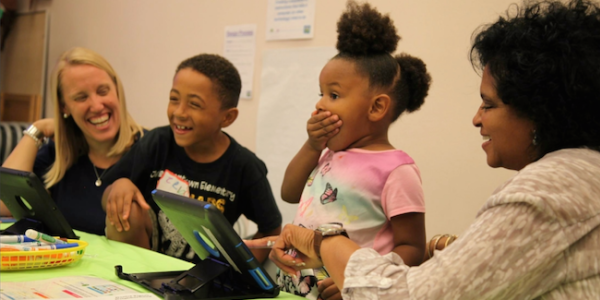
As an early childhood educator, you know that many parents are on a continuous journey to discover tools and resources that support their children’s learning outside of the classroom. But it’s especially hard to find tools that are engaging, educational, and developmentally appropriate for both young children and their families. With a plethora of educational resources out there, what can families do to set their children on the path to be lifelong learners in meaningful ways? As multiplatform media has become a way of life, it is becoming more important for families to balance on- and off-screen learning.
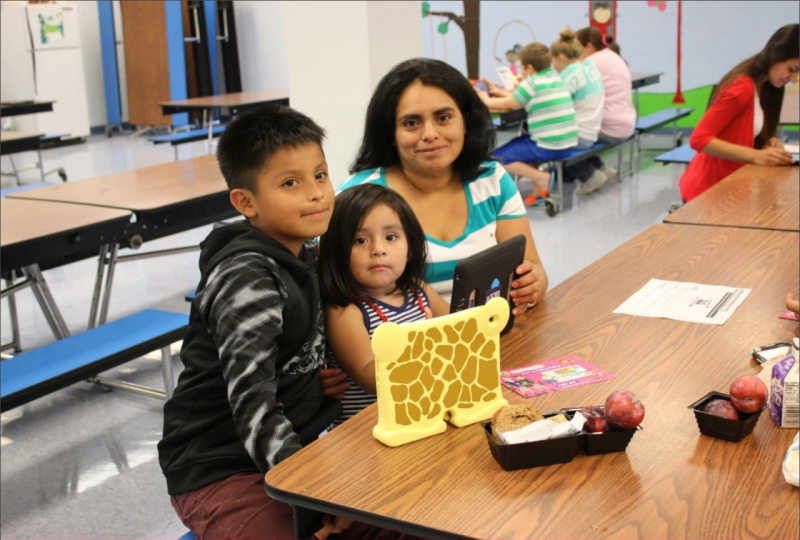 PBS KIDS recently developed and piloted Family Creative Learning, a new outreach and family engagement model with local member stations in 11 communities and funded with a Ready To Learn grant by the US Department of Education to the Corporation for Public Broadcasting and PBS. Families and children are provided with tablets during a set of workshops, and facilitators support families as they navigate the PBS KIDS ScratchJr app to create action sequences and animations for characters through block-based coding. The workshops offer families and children the opportunity to have one-on-one time to explore technology while learning collaboratively with their kids. The workshops are set in community-based settings so families feel comfortable, and dinner is provided to make it easier for them to attend amidst their busy schedules. The model for the workshops is informed by Ricarose Roque’s work, the decades of pioneering two-generational work from the National Center for Families Learning, best practices in project-based and inquiry-based learning for young children, and the idea, expressed recently by the Fred Rogers Center in this blog, that the context around media use matters. Rather than thinking about technology as a stand-alone solution, there are benefits to using it as an interactive content tool to help support learning and relationship-building.
PBS KIDS recently developed and piloted Family Creative Learning, a new outreach and family engagement model with local member stations in 11 communities and funded with a Ready To Learn grant by the US Department of Education to the Corporation for Public Broadcasting and PBS. Families and children are provided with tablets during a set of workshops, and facilitators support families as they navigate the PBS KIDS ScratchJr app to create action sequences and animations for characters through block-based coding. The workshops offer families and children the opportunity to have one-on-one time to explore technology while learning collaboratively with their kids. The workshops are set in community-based settings so families feel comfortable, and dinner is provided to make it easier for them to attend amidst their busy schedules. The model for the workshops is informed by Ricarose Roque’s work, the decades of pioneering two-generational work from the National Center for Families Learning, best practices in project-based and inquiry-based learning for young children, and the idea, expressed recently by the Fred Rogers Center in this blog, that the context around media use matters. Rather than thinking about technology as a stand-alone solution, there are benefits to using it as an interactive content tool to help support learning and relationship-building.
Here are some key family engagement takeaways from the PBS KIDS Family Creative Learning workshops:
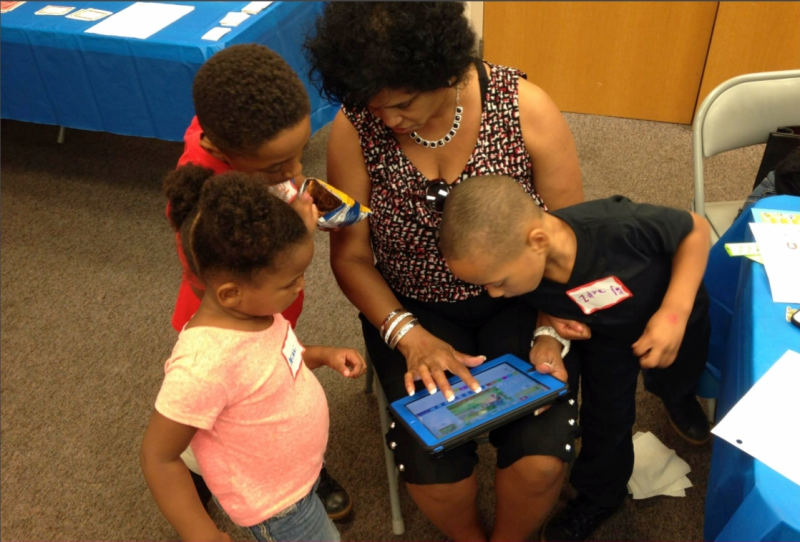 Time and space to spend together are gifts to be treasured: Family life can be hectic and chaotic. While experts talk about the benefits of coviewing and coengagement, many adults understandably use the time their child is engaged with trusted content to complete necessary tasks. While it is a big ask to get families to commit to multiple sessions of the workshops for two hours at a time, adults are grateful for uninterrupted time to engage with their kids as well as with other families. Educators who encourage coengagement among the families in their programs know that it makes a big difference. In addition to encouraging coengagement habits, it is incredibly valuable to support families by offering them the time and space to leave everything else at the door so they can hang out, play, and learn with one another without distractions.
Time and space to spend together are gifts to be treasured: Family life can be hectic and chaotic. While experts talk about the benefits of coviewing and coengagement, many adults understandably use the time their child is engaged with trusted content to complete necessary tasks. While it is a big ask to get families to commit to multiple sessions of the workshops for two hours at a time, adults are grateful for uninterrupted time to engage with their kids as well as with other families. Educators who encourage coengagement among the families in their programs know that it makes a big difference. In addition to encouraging coengagement habits, it is incredibly valuable to support families by offering them the time and space to leave everything else at the door so they can hang out, play, and learn with one another without distractions.
- Families deserve a strength-based approach: There is no shortage of advice and information conveyed to families, often leaving them feeling unprepared to face the many challenges of parenting. A main goal of the workshops (and all family engagement experiences) is for families to leave feeling empowered in their ability to support their children’s learning. Instead of spending time instructing families, the model encourages conversations between families in the room in an effort to build upon their ideas and their strengths, rather than imposing advice from others. This approach not only supports confidence-building in families— it also encourages the development of connections and relationship-building.
- Supporting diverse learners: Family Creative Learning is designed to support interest-driven exploration, creativity, and play among families. A critical component is providing multiple entry points and pathways for a range of diverse participants. Kids learn differently from one another—they have different interests, strengths, and ways of engaging with each other and with the world around them. The same is true for adults, who are rarely given the opportunity to assume the role of learner alongside their children. As the model evolves, additional resources and pathways will be created as needed in an effort to support both young and adult learners.
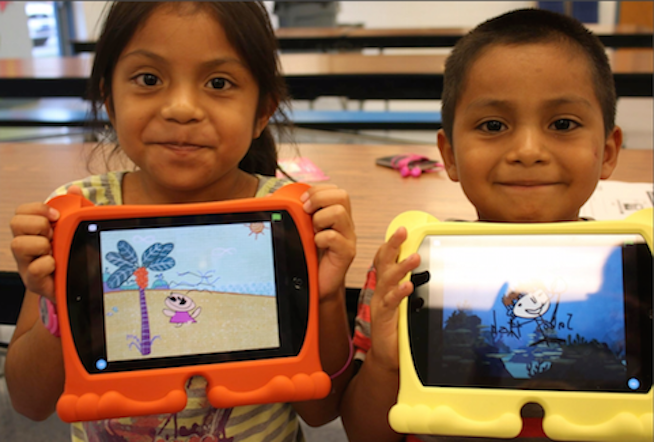
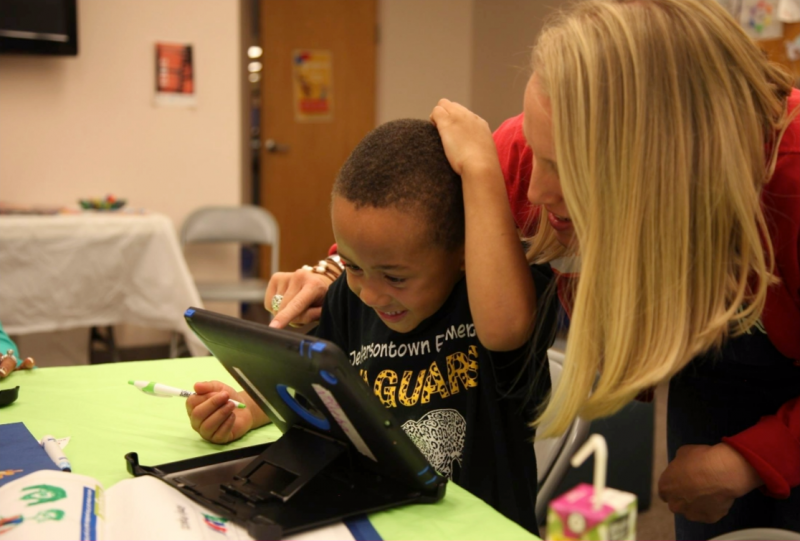
The education of young children and families is some of the most exciting and fulfilling work there is. Asking families to engage with one another in a supportive environment while enjoying time with their children can be an excellent model for sharing new technology and trusted interactive content, and helps to build a community within your program.
Aaron Morris is the senior manager of community engagement content at PBS Kids, working on behalf of the CPB-PBS Ready To Learn Initiative.
Aaron works collaboratively with education professionals at PBS Stations and the producers of PBS KIDS' media properties to create impactful learning experiences for children and families through outreach and community engagement efforts that meaningfully leverage PBS KIDS content and resources.
If you would like to implement something similar in your classroom or program, you may find the ideas and strategies in our PBS KIDS Family Creative Learning Facilitator Guide useful.